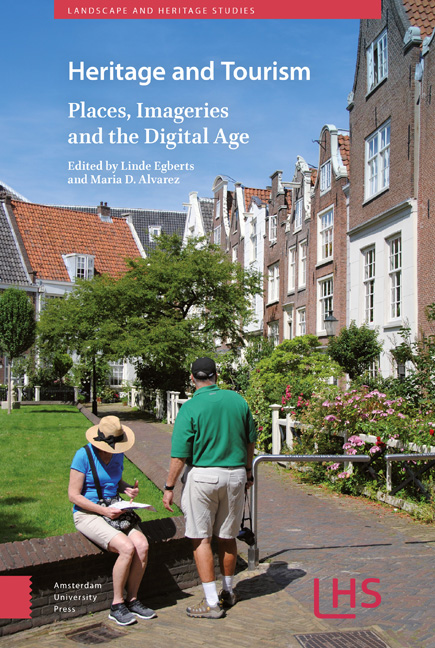Book contents
- Frontmatter
- Dedication
- Contents
- List of Figures and Tables
- Foreword
- 1 Tourism and Heritage: Crafting Experiences Through Innovation
- 2 Tourism Conflicts and Conflict Tourism: Curating “Holoscapes” in Europe’s Age of Crisis
- 3 Heritage Landscapes of Hiroshima and Nagasaki
- 4 Revealing and Presenting the Past(s) for the Public: Fethiye Mosque and Museum as a Cultural Heritage Site in Istanbul
- 5 Who Takes the Lead in Initiating Cooperation in a Cultural Network and Why?: The case study of a Rural Finnish Destination
- 6 Sustainability of Heritage-Tourism Destinations: A Demand-Based Perspective on Cusco, Peru
- 7 Localising National Tourism Websites: The case of World Heritage sites
- 8 Enhancing the Tourist Heritage Experience through “In-Situ”, Customisable, 3D-Printed Souvenirs
- 9 Tracking the Heritage Tourist: Heritage tourism and Visiting Patterns in a Historic City
- 10 The Construction of a Tourist-Historic Icon: The case of the Palace of Westminster, London
- 11 Conclusion
- Index
Foreword
Published online by Cambridge University Press: 22 December 2020
- Frontmatter
- Dedication
- Contents
- List of Figures and Tables
- Foreword
- 1 Tourism and Heritage: Crafting Experiences Through Innovation
- 2 Tourism Conflicts and Conflict Tourism: Curating “Holoscapes” in Europe’s Age of Crisis
- 3 Heritage Landscapes of Hiroshima and Nagasaki
- 4 Revealing and Presenting the Past(s) for the Public: Fethiye Mosque and Museum as a Cultural Heritage Site in Istanbul
- 5 Who Takes the Lead in Initiating Cooperation in a Cultural Network and Why?: The case study of a Rural Finnish Destination
- 6 Sustainability of Heritage-Tourism Destinations: A Demand-Based Perspective on Cusco, Peru
- 7 Localising National Tourism Websites: The case of World Heritage sites
- 8 Enhancing the Tourist Heritage Experience through “In-Situ”, Customisable, 3D-Printed Souvenirs
- 9 Tracking the Heritage Tourist: Heritage tourism and Visiting Patterns in a Historic City
- 10 The Construction of a Tourist-Historic Icon: The case of the Palace of Westminster, London
- 11 Conclusion
- Index
Summary
Tourism offers the possibility of benefitting from the economic dimension of heritage and harnessing it to help fund cultural and natural conservation. In a resource-constrained world, material and immaterial heritage can be used to support two extremely different narratives concerning development. The neoliberal narrative holds that technological solutions reduce resource use and therefore conserve cultural and natural resources.
Heritage and tourism have become complex phenomena due to their political, economic, social, cultural, aesthetic, and environmental dimensions. A satisfactory balance between tourist expectations and the aspirations of residents to enjoy an undisturbed life in their local community has often proven hard to achieve both in theoretical debates and in practice. One argument is that host communities and local property owners should be involved in planning for tourism and conservation, since the latter enhance natural and cultural-heritage features and these people profit from them economically. However, to what extent does existing research on the subject address this issue? In any case, what research there is has not been widely disseminated enough to be of benefit to practitioners.
Improving heritage tourism practice will ultimately require bringing the academic and practice communities together to conduct research. With this end in mind, the Second Heritage, Tourism and Hospitality International Conference 2015 held in Amsterdam, the Netherlands (26-27 November 2015) placed the paradoxical theme “heritage meets innovation” centre stage. Initiated by the Rotterdam School of Business of Erasmus University, Elgin & Co., the research institute CLUE+ of the Vrije University Amsterdam, and the Amsterdam School for Heritage, Memory and Material Culture of the University of Amsterdam, the conference underscored the urgent need to make strategic decisions concerning the future of the heritage enterprise. Heritage decision makers must find ways of analysing the underlying market structure of their domain, and of questioning whether current trends are somehow interrelated, so that they can better plan for the future. Granted, at the same time, they must acknowledge that a lot in the future is fundamentally uncertain.
The past 25 years have witnessed a profound shift brought about by computing, which has dramatically reduced the time needed to communicate information, easily bridging great distances and producing a new global connectedness.
- Type
- Chapter
- Information
- Heritage and TourismPlaces, Imageries and the Digital Age, pp. 11 - 16Publisher: Amsterdam University PressPrint publication year: 2018



